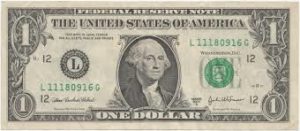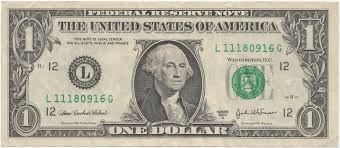 It doesn’t have to cost anything to puzzle and riddle the mind, giving it exercise. However, can you find the missing dollar?
It doesn’t have to cost anything to puzzle and riddle the mind, giving it exercise. However, can you find the missing dollar?
The riddle of the Missing Dollar, for a first time reader, always causes one to stop and think. The facts are presented in such a way that the reader tags right along with the logical approach to it all, until the end! The riddle is as follows:
Three guests check into a hotel room. The cost is 30 dollars. The guests share the cost of the room, so each guest gives the hotel clerk 10 dollars. After the three guests go to the room, the clerk realizes he made a mistake and the cost of the room is actually only 25 dollars. The hotel clerk gives 5 dollars to the bellhop and tells him to return the overcharge to the three guests.
On his way, the bellhop realizes 5 dollars cannot be equally split 3 ways, so he decides to keep 2 dollars for himself and gives each guest 1 dollar back. This means each guest paid 9 dollars for the hotel room for a total 27 dollars. The bellhop has 2 dollars. This only adds to 29 dollars, but the guests originally paid 30 dollars. Where did the missing dollar go?
The above riddle is a mixing of information to create the dilemma. Because the telling of the story follows what seems to be a perfectly logical approach, the twist presented at the end comes as a surprise. Unless the reader immediately realized the calculations of adding and subtracting are not ‘logical’, the consequence of a ‘missing dollar’ is a mystery.
This simple exercise demonstrates how our minds can be easily guided to create false situations. Nonetheless, a reader, taking a moment to go back through the riddle and carefully thinking about the issue, will most likely find the ‘twist’ and the ‘missing dollar’. Can you find the missing dollar?
Riddles do not have to be complex to be enjoyed. Many times, riddles, like the above, are the most entertaining when a person knows the answer rests in their thinking. Although the challenge to find the cause of mistaken thoughts may be frustrating, it is rewarding, once found.
E.I. Horsman stated this in his instructions for the 24 Puzzle (copyright 1891), (another great puzzle) “We do not furnish the answer, because the fun consists in finding it.” (However, I’ll post the answer in comments sometime next week for future reference.)
Studies have proven that just like the body benefits from using its muscles, so does our mind benefit from exercising the brain. So, take just a moment to consider it yourself.
Best of luck with all that you seek! Treasure the Adventure Always!


Wow! Might be wrong but each guest assumes they paid 9.00 for the room after getting a dollar back, but they actually paid 8.33 for the room, so if you add back the 3.00 each received and th 2.00 taken by the bell hop there really is only 1 penny missing
Lol…
True that, Illinoisghost.
Furthermore…each guest ACTUALLY paid 8.333333333333 etc. ad infinitum…so there is no missing penny.
Right?
So to clarify…when the bellhop gave each of the guests 1 dollar back…they had each paid 9.33333(4) for the room…i.e. $28. The bellhop kept .666 from each guest.
I knew it! The bellhop is the devil! 😮
They paid $27 for a $25 room, the bell hop kept the change.
Iguanas vs Snakes….yikes! that was good.
I love this one ! Thanks Jenny.
Happiness cost a Dollar 🙂
Soo… the Hotel Clerk is Happy because he thinks he was being honest and gave the three guest back the difference in the room fee.
The Three Guests are happy because they saved money and now think they are staying at a honest place.
The Bellhop is happy because the Three Guests never gave him a tip and they had a ton of baggage!!!
So for the loss of one dollar everyone is Happy… I think our mind works to make us see thinks to make us happy even if they are not actually true in reality 🙂 Also, I don’t like to do math so I like this solution better 🙂
I got it, but it took a while-
Ouchh! This reminds me a lot of doing taxes, Schedule D, and splitting a transaction into long term, short term, and wash sales.
The guests gave $27, the hotel desk and bellhop are holding $25 + $2.
I ran into this riddle about twenty years ago, while working in Myrtle Beach. The “twist” is the part that confounds a lot of people who engage it.
The premise is that the 3 guests paid a total of 30 dollars, and then the discount arrives into the story. At that point the narrator switches gears from feeding information, to twisting information to fit another possibility. What the author does here, is plant the seed of 30 dollars in the reader’s head, and keeps twisting the passing of money… all the while keeping that thought of 30 in their minds. In fact, once, the clerk gives the refund to the bellhop, the 3o dollars is no longer an issue of the story, but the author intends to keep it a part of the story to confuse.
Once the bellhop gives the 3 dollars back to the guests, the total is now 27… not 30. The number 30 no longer needs to be a part of the conversation, because it doesn’t exist. It’s kind of like a magician opening one hand showing you what they gave initially (30 dollars), and then he holds his other hand out and shows the 27 (9×3) dollars with the 2 dollar tip, and implies that you still need to make it all add to 30.
But the truth is, once they get their dollars back, the total amount they paid is 27 dollars… not 30. At that point it’s all about the 25 dollar room and the 2 dollar tip like Astree mentioned. 😛
25 dollars plus 3 is 28. plus the two dollar tip..add to 25 not subtract off 30 nobody paid 27. they paid 10 and lost 2